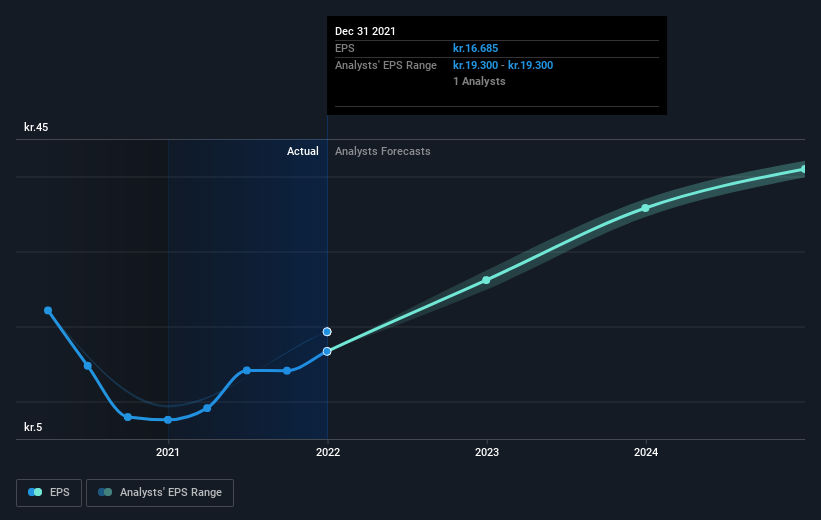- Denmark
- /
- Marine and Shipping
- /
- CPSE:DFDS
The five-year shareholder returns and company earnings persist lower as DFDS (CPH:DFDS) stock falls a further 3.5% in past week
Ideally, your overall portfolio should beat the market average. But in any portfolio, there will be mixed results between individual stocks. At this point some shareholders may be questioning their investment in DFDS A/S (CPH:DFDS), since the last five years saw the share price fall 18%.
With the stock having lost 3.5% in the past week, it's worth taking a look at business performance and seeing if there's any red flags.
See our latest analysis for DFDS
In his essay The Superinvestors of Graham-and-Doddsville Warren Buffett described how share prices do not always rationally reflect the value of a business. By comparing earnings per share (EPS) and share price changes over time, we can get a feel for how investor attitudes to a company have morphed over time.
During the five years over which the share price declined, DFDS' earnings per share (EPS) dropped by 8.9% each year. This fall in the EPS is worse than the 4% compound annual share price fall. So the market may previously have expected a drop, or else it expects the situation will improve.
The company's earnings per share (over time) is depicted in the image below (click to see the exact numbers).

We know that DFDS has improved its bottom line lately, but is it going to grow revenue? This free report showing analyst revenue forecasts should help you figure out if the EPS growth can be sustained.
What About Dividends?
When looking at investment returns, it is important to consider the difference between total shareholder return (TSR) and share price return. Whereas the share price return only reflects the change in the share price, the TSR includes the value of dividends (assuming they were reinvested) and the benefit of any discounted capital raising or spin-off. So for companies that pay a generous dividend, the TSR is often a lot higher than the share price return. We note that for DFDS the TSR over the last 5 years was -13%, which is better than the share price return mentioned above. This is largely a result of its dividend payments!
A Different Perspective
We're pleased to report that DFDS shareholders have received a total shareholder return of 17% over one year. That's including the dividend. That certainly beats the loss of about 2% per year over the last half decade. We generally put more weight on the long term performance over the short term, but the recent improvement could hint at a (positive) inflection point within the business. It's always interesting to track share price performance over the longer term. But to understand DFDS better, we need to consider many other factors. For instance, we've identified 2 warning signs for DFDS that you should be aware of.
For those who like to find winning investments this free list of growing companies with recent insider purchasing, could be just the ticket.
Please note, the market returns quoted in this article reflect the market weighted average returns of stocks that currently trade on DK exchanges.
New: Manage All Your Stock Portfolios in One Place
We've created the ultimate portfolio companion for stock investors, and it's free.
• Connect an unlimited number of Portfolios and see your total in one currency
• Be alerted to new Warning Signs or Risks via email or mobile
• Track the Fair Value of your stocks
Have feedback on this article? Concerned about the content? Get in touch with us directly. Alternatively, email editorial-team (at) simplywallst.com.
This article by Simply Wall St is general in nature. We provide commentary based on historical data and analyst forecasts only using an unbiased methodology and our articles are not intended to be financial advice. It does not constitute a recommendation to buy or sell any stock, and does not take account of your objectives, or your financial situation. We aim to bring you long-term focused analysis driven by fundamental data. Note that our analysis may not factor in the latest price-sensitive company announcements or qualitative material. Simply Wall St has no position in any stocks mentioned.
About CPSE:DFDS
DFDS
Provides logistics solutions and services in Denmark and internationally.
Undervalued with moderate growth potential.
Similar Companies
Market Insights
Community Narratives



